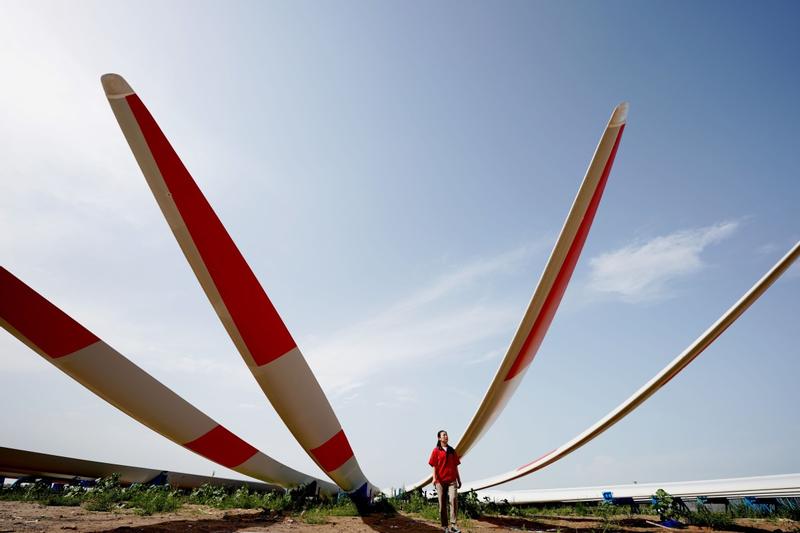 In this undated file photo, a technician checks wind turbine blades at a plant in Weixian county, Hebei province. (PHOTO / XINHUA)
In this undated file photo, a technician checks wind turbine blades at a plant in Weixian county, Hebei province. (PHOTO / XINHUA)
Stronger policy supports are likely to unfold in the coming months to anchor China's manufacturing activity-and alleviation of the cost pressure being faced by small businesses and boost to infrastructure investment will likely be under the spotlight, experts said on Wednesday.
They made the comments after a private survey showed China's manufacturing sector posted its first contraction over the past 16 months in August, as per its parameters, as the resurgence in local COVID-19 cases hampered production and dampened demand.
The Caixin China General Manufacturing Purchasing Managers' Index came in at 49.2 in August, down from 50.3 in July and dropping through the 50-mark that separates expansion from contraction for the first time since April 2020, media group Caixin said in a report on Wednesday
The Caixin China General Manufacturing Purchasing Managers' Index came in at 49.2 in August, down from 50.3 in July and dropping through the 50-mark that separates expansion from contraction for the first time since April 2020, media group Caixin said in a report on Wednesday.
"The latest COVID-19 resurgence has posed a severe challenge to the economic normalization that began in the second quarter of last year," said Wang Zhe, senior economist at Caixin Insight Group.
The reading came after China's key economic data like retail sales and industrial output missed market expectations in July.
The official PMI, released on Tuesday by the National Bureau of Statistics, also fell from 50.4 in July to 50.1 in August, the lowest level in 18 months.
Most experts said manufacturing activity will recoup its recovery momentum this month onward as the short-lived impacts of fresh COVID-19 cases and heavy rains fade away.
Structural problems like elevated commodity prices and lackluster domestic demand, however, may continue and restrict room for the expected rebound, making stronger policy supports necessary in the near term, they said.
"The authorities concerned need to take a holistic view and balance containing COVID-19, stabilizing the job market, and maintaining stability in supply and prices," Wang said.
Structural problems like elevated commodity prices and lackluster domestic demand, however, may continue and restrict room for the expected rebound, making stronger policy supports necessary in the near term, experts said
The Caixin survey showed that higher raw material prices and greater transportation costs have accelerated the rise in input prices for manufacturers last month.
ALSO READ: Commodity price surge may soon peak
Output prices, meanwhile, registered moderate growth in August, pointing to the sector's limited pricing power to pass the rising costs to clients amid lackluster market demand, the survey said.
Smaller businesses, which typically belong to downstream sectors, have borne the brunt of cost pressure, experts said.
The official PMI for small manufacturers has stayed in contraction territory for four consecutive months and came in at 48.2 last month, the NBS said.
"Cost pressure for mid and downstream companies remained," analysts with CITIC Securities said in a report.
Policymakers are therefore likely to sharpen their focus on stabilizing raw material supply and prices as well as safeguarding the operating conditions of small businesses, they said.
Experts also said they expect the government to bolster market demand by shoring up the growth in infrastructure investment-a laggard in the country's investment recovery-which can help offset the possible cooling in property development and softening in export growth.
New export orders shrank modestly in August due to logistics disruptions and the continued global pandemic, amid a broader decline in the total new orders accepted by manufacturers, the Caixin survey showed.
READ MORE: E-commerce techniques ‘key to manufacturers’ survival’
There have been signs of ramped-up infrastructure investment. The official PMI reading for civil engineering jumped to 60.8 in August, versus 54.4 in July, indicating accelerating construction activity in the sector, the NBS said.
The Ministry of Finance said in a report on Friday that the ministry will expedite the issuance of local government special bonds, which are deemed a key funding channel for infrastructure investment, in the remainder of the year to strengthen the real economy and boost employment.


